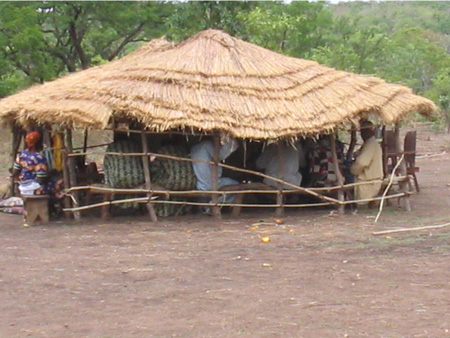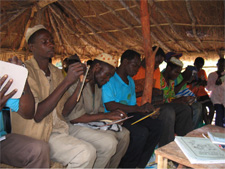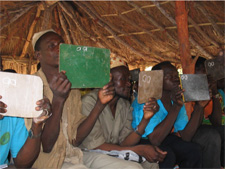Benin
Supporting Literacy for Integrated Development
POTAL MEN
Country Profile
Population: 8 439 000 (2005)
Population below national poverty line: 29 % (1999)
Adult Literacy Rate: 35 % (2002-2004)
HIV-rate in adults (15-49): 1.8 % (2005)
Context
Illiteracy in Benin (estimated at 70%) is a scourge which the state and NGOs are working to curb. It is affecting the members of Fulani communities, 97% of whom are illiterate, yet who represent the nation’s main breeders of livestock, owning 87% of all livestock. Clustered primarily in the northern and central regions of Benin, their main activity is livestock rearing along with the cultivation of cereals (maize and sorghum) for family consumption. Unfortunately the natural environment in which the Fulbe pursue their livestock-breeding activities, which used to be well balanced, is currently endangered not only by massive population growth but also mismanagement of natural resources. This situation is causing frequent conflicts among farmer-breeders over shared natural resources.
At the same time, the transfer of skills to community members through training is a key factor in the context of decentralisation and efforts to tackle poverty. The problem facing these programmes of training lies in the question of how to ensure that it will be effective in environments where 97% of the population is illiterate.

Centre d’alphabétisation type
Programme
In the northern and eastern regions of the Atacora department (home to the communes of Kouande, Pehunco and Kerou), efforts to promote literacy in Fulfulde have received support from a German project, the Livestock Rearing Promotion Project in Atacora, founded by the German Corporation for Technical Cooperation (GTZ) in 1992. The beneficiaries showed a genuine interest in literacy training. They were enabled to enhance their activities through the creation of water impoundments and grazing corridors, as well as through a series of training sessions on rearing techniques, thus demonstrating that literacy was a matter of real concern to them. Literacy has thus helped members of the community to achieve a certain cohesion in their activities and, most importantly, to create a process and framework through which they are able to share their activities and discuss development problems. This has allowed them to shape their own lives and environment in a sustainable fashion.
Following the withdrawal of the Livestock Rearing Promotion Project (PPEA/GTZ) in 1997, the newly literate people, learners, literacy teachers, centre managers and Fulani community elders met at a general assembly in Kouande to discuss ways and means of continuing the literacy initiatives. To this end, a decision was taken to create a community non-government organisation called POTAL MEN.
POTAL MEN’s initial aim was to pursue the literacy activities conducted by PPEA/GTZ. However, from 1998 onwards and at the behest of participating groups, its activities were diversified to broaden its scope of action to include: functional literacy; the study of French; organisational capacity-building for farmers and learner groups through training; information, education and communication (IEC); the promotion of livestock rearing; self-run savings and loan schemes; environmental protection; and health (hygiene, the campaign against excision and HIV/AIDS).
The main objective is to help grassroots community groups, especially those for young people and women, to become self-sufficient and to promote their self-development on the national, regional and international levels by means of a well-integrated literacy programme. The other goals of the programme are to:
- seek, adapt and distribute appropriate technologies to farmer-breeders in fields such ashealth, livestock breeding, agriculture and the fight against desertification;
- promote and encourage the development of economic, social and cultural activity; and
- promote a literate Fulfulde environment.
The health component of the programme and its focus on addressing STIs/AIDS should be seen as an integral part of the government of Benin’s public health policy, a major aim of which is to slow down or, if possible, stop the advance of these diseases which are spreading at a dangerous rate in cities and the countryside. This health crisis is heightening the level of poverty of people living in the towns and countryside of the Republic of Benin.
POTAL MEN’s target groups are people living in remote areas,in particular the Fulani – farmer-breeders who make up 12% of the population of Atacora and Donga. Within this group, the main focus is on young people (male and female) aged between 15 and 30. This section of the population generally has little access to medical infrastructures (hospitals, communal health centres, community clinics etc.) or practical information on STIs and HIV/AIDS, which means that they are engaging in practices that expose them to a high risk of being infected with STIs and HIV/AIDS (unprotected sex, excision, tattoos, or multiple circumcisions using the same scalpel). Studies have shown that the number of cases of HIV/AIDS is growing at a dangerous rate in Benin (0.36% in 1990 rising to 3.64% in 2005). The situation is even more alarming in rural areas, with rates of 5.1% and even 14% in some sub-prefectures. In certain regions, the rate of infection among young girls is higher than that for boys.
Through its community health component, POTAL MEN has carried out risk reduction activities in the area of HIV/AIDS prevention in villages and literacy centres. These include:
- raising public awareness in Fulani camps and hamlets;
- organising activities in literacy centres;
- training community representatives (peer educators) in Fulani camps and hamlets;
- organising STI and HIV/AIDS days;
- organising evenings for singing and telling stories about STIs and HIV/AIDS in Fulani camps;
- producing leaflets in Fulfulde about STIs and HIV/AIDS; and
- involving traditional healers in the campaign against STIs/AIDS.


Les apprenants au cours d’alphabétisation en fulfulde
The learning methods used are both global and syllabic, based on a participatory and active approach that brings learners’ knowledge to the fore through discussions of socio-economic issues, role-playing activities or stimulus exercises. While learning to read and write, literacy students also learn more about themselves and the environment they live in.
The literacy teachers/facilitators are central to all these activities. Aside from preparing literacy and activity sites, and organising activities in literacy centres, they also take part in decentralised training on leadership techniques, train community representatives (peer educators) in Fulani camps and hamlets and carry out periodic assessments.
As a result of POTAL MEN’s efforts, 7,364 people, including 1,932 women, have achieved literacy between 1997 and 2007, while 90 lead literacy teachers have been trained in learning techniques for adults. The approach of promoting literacy for integrated development has proved to be consistent with the mentality of the Fulde and become a gateway for development. Newly literate people have likened the reading and activity clubs to the "story tree" under which village elders used to share their knowledge.
There has been a remarkable change in behaviour with regard to human health (e.g. the practice of excision is dying out), animal health (e.g. there are now village poultry vaccinators) and social status (e.g. secretaries for village groups selling cotton, radio presenters and dressmakers), as well as improvements in the storage and sale of Fulani cheese, and natural resource management (e.g. the creation of a Fulani botanical garden in Papatia).
The expected outcomes for the programme’s health component are that:
- around 70% of farmer-breeders will gain a knowledge of STIs/AIDS;
- there will be a higher demand for condoms in rural areas;
- the number of new STI cases will go down; and
- young people (girls and boys) and adults will change their sexual behaviour.
One of the key lessons of this programme is that eliminating literacy is seen not as an end in itself but rather as a gateway to the economic, social and cultural development of all Fulde communities. Teaching is initially in Fulfulde and later French for post-literacy activities, drawing on the knowledge gained from initial literacy training.
As regards the conceptual model, it must be emphasised that the programme was developed jointly with beneficiaries and with the support of other actors from the region. A number of workshops were held with learner groups, literacy teachers, supervisors, the board of directors, the executive management board and other local actors. The results and consultations were then presented to them for amendment. This consensual approach is intended to encourage beneficiaries to become involved in the programme and play a major role in it.
Although the outcomes of the programme have been encouraging, there are still a number of challenges that must be be overcome:
- The post-literacy programme must be boosted in the face of rising multi-sector demand from people who have become literate. There is a need for further training in human health, animal health, basic French for external communication, natural resource management and conflict resolution skills for the use of shared resources. Additional support is also required in order to facilitate the transition to a settled way of life.
- Action is still needed to achieve mass active participation of women in literacy classes.
- The programme’s failure to deal with the real concerns of learners must be addressed.
Nevertheless, it is important to stress that a literacy programme needs to be worked out in partnership with beneficiaries and with the support of other local actors. With regard to grassroots-level intervention, inter-sector collaboration has benefited from the participation of other actors from civil society or the state because all development problems are interdependent and cannot be resolved in isolation. Boosting the impact of the programme and making it sustainable will require mutual support on the part of the various contributors and a harmonisation of grassroots-level activity.
Contact
Bio OROU DJEGA,
Executive Director
POTAL MEN
BP: 285
Natitingou
Bénin
potalmen@yahoo.fr
biodjega@yahoo.fr

 Homepage
Homepage